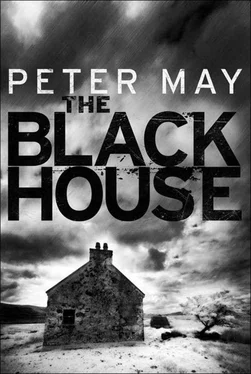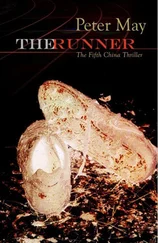Peter May - The Blackhouse
Здесь есть возможность читать онлайн «Peter May - The Blackhouse» весь текст электронной книги совершенно бесплатно (целиком полную версию без сокращений). В некоторых случаях можно слушать аудио, скачать через торрент в формате fb2 и присутствует краткое содержание. Жанр: Триллер, на английском языке. Описание произведения, (предисловие) а так же отзывы посетителей доступны на портале библиотеки ЛибКат.
- Название:The Blackhouse
- Автор:
- Жанр:
- Год:неизвестен
- ISBN:нет данных
- Рейтинг книги:5 / 5. Голосов: 1
-
Избранное:Добавить в избранное
- Отзывы:
-
Ваша оценка:
- 100
- 1
- 2
- 3
- 4
- 5
The Blackhouse: краткое содержание, описание и аннотация
Предлагаем к чтению аннотацию, описание, краткое содержание или предисловие (зависит от того, что написал сам автор книги «The Blackhouse»). Если вы не нашли необходимую информацию о книге — напишите в комментариях, мы постараемся отыскать её.
The Blackhouse — читать онлайн бесплатно полную книгу (весь текст) целиком
Ниже представлен текст книги, разбитый по страницам. Система сохранения места последней прочитанной страницы, позволяет с удобством читать онлайн бесплатно книгу «The Blackhouse», без необходимости каждый раз заново искать на чём Вы остановились. Поставьте закладку, и сможете в любой момент перейти на страницу, на которой закончили чтение.
Интервал:
Закладка:
I heard Donald shouting, ‘Stop it! Fucking stop it!’
And then Angel’s low, threatening tone. ‘You gonna make me, God boy? Two’s better than one. It could be you next.’
There was a moment’s silence, and then Calum wailing, ‘We gotta go!’
I heard footsteps running off into the distance, and then an odd peace settled on the night along with the frost. I couldn’t move, did not even have the strength to roll over. I was vaguely aware of more lights coming on in nearby houses. I heard someone shouting, ‘The store! There’s a break-in at the store!’ The beams of torches pricked the night air. Then hands pulled me roughly to my feet. I could barely stand. I felt a shoulder support me under each oxter, then Donald’s voice.
‘You got him, Artair?’
And Artair’s familiar wheeze. ‘Aye.’
And they dragged me, running, across the road and into the ditch.
I’m not sure how long we lay there in the ice and mud, hidden by the long grass, but it seemed like an eternity. We saw the locals arriving in their dressing gowns and wellies, beams of light flashing around the road and the shopfront. And we heard their consternation. A six-foot tractor tyre embedded in the shop window and not a soul around. They decided that no one had actually broken into the shop, but that they had better call the police, and as they headed back towards their houses, Donald and Artair got me to my feet and we staggered off across the frozen peatbog. At a gate in the shadow of the hill, Donald waited with me while Artair went off to retrieve my bike. I felt like hell, and worse. But I knew that Donald and Artair had risked being caught by coming back to get me.
‘Why’d you come back?’
‘Och, it was my stupid idea in the first place,’ Donald sighed. ‘I wasn’t going to let you take the blame for it.’ And then he paused. I couldn’t see his face, but I heard the anger and frustration in his voice. ‘One day I’m going to rip that fucking Angel Macritchie’s wings off.’
They never did find out who had run the Swainbost tyre through the window of Crobost Stores. But they weren’t about to give it back to the Swainbost boys. The police impounded it, and Crobost had the best bonfire in Ness that year.
FIVE
I
Fin walked up the single-track road towards the village with the wind blowing soft in his face. He glanced down the hill and saw the distant figure of Gunn heading back to Port of Ness to retrieve the car. He felt the first spots of rain, but the black sky overhead was breaking up already, and he thought that perhaps it wouldn’t come to anything.
It might have been August, but someone had a fire lit in their hearth. That rich, toasty, unmistakable smell of peat smoke carried to him on the breeze. It took him back twenty, thirty years. It was extraordinary, he thought, how much he had changed in that time, and how little things had changed in this place where he had grown up. He felt like a ghost haunting his own past, walking the streets of his childhood. He half expected to see himself and Artair coming around the bend in the road at the church, heading on their bikes for the store at the foot of the hill to spend their Saturday pennies. The cry of a child made him turn his head, and he saw two small boys playing on a makeshift swing next to a house on the rise above him. Clothes flapped on a drying line and, as he watched, a young woman came hurrying out of the house to gather them in before the rain came.
The church sat proud on the bend, looking out over the village below, and the land that fell away to the sea. The large metalled car park was new since Fin had last been here. In and Out gates were protected from sheep and their shit by cattle grids, and the tarmac was marked out with freshly painted white lines, worshippers guided to park their cars in orderly Christian rows. In Fin’s day, people had walked to church. Some of them from miles around, black coats blowing about their legs, free hands holding on to hats, the others clutching bibles.
Steps led up from the car park to the manse, a large two-storey house built in the days when the Church had expected its ministers to require three public rooms and five bedrooms, three for family, one for any visiting minister and one for use as a study. The manse had stunning views over the north end of the island, all the way across to the distant skyward-pointing finger of the lighthouse. It was also exposed to the wrath of God in the form of whatever weather might descend on it from the Heavens. Even the minister was not spared the Lewis weather.
Beyond the curve of the hill, the road rose higher again with the land, along the clifftops, and the rest of Crobost was strung out along it for nearly half a mile. Although he couldn’t see them from here, Fin knew that the bungalow where Artair used to live, and his parents’ croft, were only a few hundred yards away. But he was not sure that he was ready yet for that. He pushed open the gate beside the cattle grid and crossed the car park to the steps leading to the manse.
He knocked on the door several times and rang the bell, but there was no reply. He tried the door and it opened into a gloomy hallway. ‘Hello! Anyone home?’ He was greeted by silence. He closed the door again and looked across towards the church. It was still massively impressive, built of great blocks of stone hewn out of local rock. Flanked by two small turrets, a bell tower rose high above the arched doorway. There was no bell in it. Fin had never known there to be. Bells were frivolous. Perhaps they smacked of Catholicism. All the windows were arched, two above the main door, one on either side of it, and four down each of the flanks. Tall, plain windows. No colourful stained glass in this austere Calvinistic culture. No imagery. No crosses. No joy.
One half of the double doors was lying open and Fin walked into the hallway where the minister would greet the congregation coming in, and shake their hands on the way out. A cheerless place, with worn floorboards and dark, varnished wood. It smelled of dust and damp clothes and time. A smell, it seemed, that had not changed in thirty years. Evocative of those long Sabbath days when Fin’s parents had made him sit through an hour and a half of Gaelic psalm-singing and a fiery midday sermon, followed by another dose at six o’clock. In the afternoon he’d had to endure two hours of Sunday school in the hall at the back of the church. When he wasn’t at church, or at Sunday school, he would have to stay in the house while his father read from the Gaelic Bible.
Fin traced his childhood footsteps through the left-hand door and into the church itself, rows of unforgiving wooden pews flanking two aisles leading to the raised and railed area at the far end, from which sombre elders would lead the psalm-singing. The pulpit rose high above, an elaborately carved dais set into the wall and reached by curving staircases on either side. Its position of elevation placed the minister in his dominant position of authority over the mere mortals whom he berated each Sunday with threats of eternal damnation. Salvation was in their own hands, he would tell them week in and week out, if only they would put themselves in the hands of the Lord.
In his head, Fin could almost hear the singing of the Gaelic psalms. A strange, unaccompanied tribal chanting which could seem chaotic to the untrained ear. But there was something wonderfully affecting about it. Something of the land and the landscape, of the struggle for existence against overwhelming odds. Something of the people amongst whom he had grown up. Good people, most of them, finding something unique in themselves, in the way they sang their praise to the Lord, an expression of gratitude for hard lives in which they had found meaning. Just the memory of it brought him out in goose-pimples.
Читать дальшеИнтервал:
Закладка:
Похожие книги на «The Blackhouse»
Представляем Вашему вниманию похожие книги на «The Blackhouse» списком для выбора. Мы отобрали схожую по названию и смыслу литературу в надежде предоставить читателям больше вариантов отыскать новые, интересные, ещё непрочитанные произведения.
Обсуждение, отзывы о книге «The Blackhouse» и просто собственные мнения читателей. Оставьте ваши комментарии, напишите, что Вы думаете о произведении, его смысле или главных героях. Укажите что конкретно понравилось, а что нет, и почему Вы так считаете.












